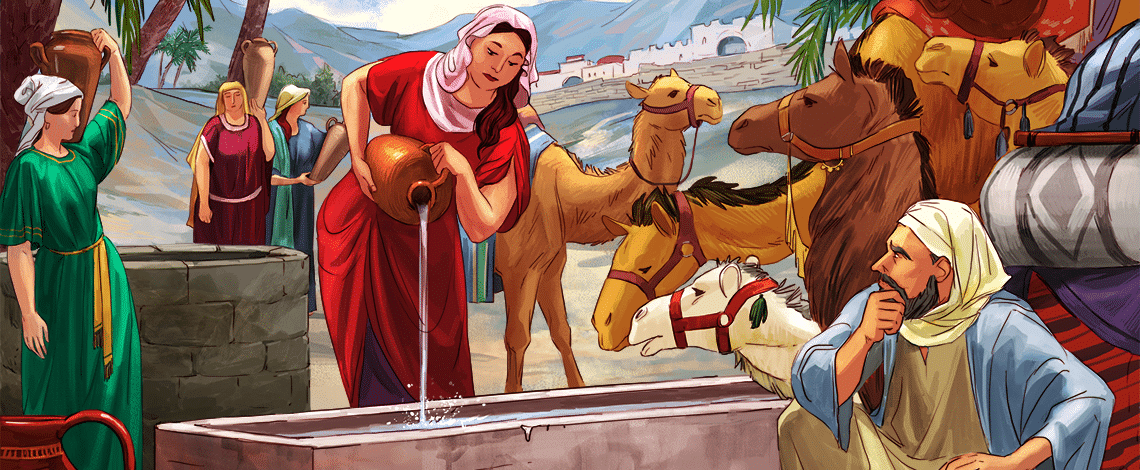The Marriage of Isaac and Rebekah
Introduction
Genesis 24 is a significant chapter in the book of Genesis as it recounts the story of the marriage of Isaac, the son of Abraham and Sarah, to Rebekah. Before diving into the events of Genesis 24, let’s provide some historical context leading up to this point in the Bible.

Historical Background:
Abraham, who was originally named Abram, lived in the city of Ur in Mesopotamia. God called him to leave his homeland and journey to a land that God would show him. Abraham obeyed this call and became known as the father of the Hebrew people and the father of faith. God made a covenant with Abraham, promising to give him a land for his descendants and to bless all nations through him.
Who was Isaac?
Isaac was the promised son of Abraham and Sarah. His birth was a miracle since Sarah was barren and past childbearing age. Isaac’s name means “laughter,” which reflects the joy that Sarah experienced when she gave birth to him. He was the long-awaited heir to the covenant God made with Abraham. Isaac played a significant role in the continuation of God’s promises to Abraham and the establishment of the nation of Israel.
Isaac is described as a peaceful and mild-mannered individual. He had a close relationship with his father, Abraham, and shared in his faith and obedience to God. Isaac demonstrated great faith when he willingly submitted to his father’s intention to sacrifice him on Mount Moriah, an event known as the “binding of Isaac.” God intervened at the last moment and provided a ram as a substitute sacrifice. Isaac’s character reveals his trust in God and his willingness to follow His plan.
The Journey of Abraham’s Servant
Abraham was concerned about finding a suitable wife for Isaac, so he sent his oldest servant to his homeland to find a wife from his own relatives rather than among the Canaanites. The journey from the Negev, the southern region of Canaan where Abraham resided, to Aram-naharaim was a long one. The servant likely travelled through the Fertile Crescent, following established trade routes and passing through various cities along the way. The exact path is not mentioned in the Bible, but it would have been a journey of several weeks or even months.
Aram-naharaim, also known as Padan-aram, was located in the upper region of Mesopotamia, encompassing parts of modern-day Syria and Turkey. It was the ancestral homeland of Abraham’s family before they migrated to Canaan.
When Abraham’s servant arrived in Aram-naharaim, he encountered Rebekah at a well. As a sign of his intentions and to determine if she was the chosen bride for Isaac, the servant gave her a nose ring and bracelets. In ancient Near Eastern culture, these items held symbolic significance. The nose ring represented a betrothal gift, signifying Rebekah’s future commitment to Isaac. The bracelets symbolized wealth and status, serving as a gift to Rebekah and her family, highlighting Isaac’s prosperity.
Who was Rebekah?
Rebekah is introduced in Genesis 24 as a member of Abraham’s extended family. She was the daughter of Bethuel, son of Nahor, Abraham’s brother. This makes Rebekah Abraham’s great-niece. Her mother’s name was Milcah. Rebekah had a brother named Laban, who would later play a significant part in the story of Jacob.
The name Rebekah means “captivating” or “to tie firmly,” and her story showcases her role in God’s plan.
Marriage in Sarah’s Tent
Isaac brought Rebekah into his mother Sarah’s tent to marry her. This act held cultural and symbolic significance. Sarah’s tent represented a place of honour and blessing within the family. By marrying Rebekah there, Isaac acknowledged her as the rightful heir to Sarah’s role and blessings. It also signified the continuation of God’s covenant through their union.
Lessons to Apply:
Faith and Trust in God:
Abraham trusted God’s promise to make his descendants into a great nation. In Genesis 24, he sends his servant to find a wife for Isaac from his own country and not from the Canaanites. Abraham’s faith and trust in God’s guidance is evident in his instructions to the servant and his belief that God will lead him to the right woman.
Prayer and Seeking God’s Guidance:
The servant’s prayer for guidance is a prominent theme in Genesis 24. Before he even begins his journey, he prays to God, asking for a specific sign to confirm the woman chosen for Isaac. This demonstrates the importance of seeking God’s guidance and involving Him in our decision-making processes.
God’s Providence and Timing:
God orchestrates events in the servant’s journey to ensure that he meets Rebekah, the chosen bride for Isaac. The servant’s prayer is answered, and he encounters Rebekah at the well, precisely at the time he had requested. This story reminds us of God’s providence and His perfect timing in our lives.
Obedience and Diligence:
The servant’s obedience to Abraham’s instructions is noteworthy. He diligently carries out his task, following Abraham’s guidance and seeking God’s help. His commitment to fulfilling his master’s request serves as an example of faithfulness and obedience.
Kindness and Hospitality:
When the servant meets Rebekah and her family, they demonstrate kindness and hospitality towards him. Rebekah and her family show generosity by providing water for the servant and his camels. This emphasises the value of treating strangers with kindness and offering hospitality to others.
The Importance of Character:
In choosing a wife for Isaac, the servant looks for specific qualities, such as kindness, generosity, and willingness to serve. This highlights the significance of character traits when seeking a life partner or making important decisions in life.
God’s Blessings:
Through the events of Genesis 24, we see God’s blessings upon Abraham, Isaac, and their descendants. The servant’s mission is successful, and Isaac and Rebekah’s marriage is blessed by God. This reminds us of the importance of aligning our decisions and actions with God’s will, as His blessings follow obedience and faithfulness.
Conclusion
Genesis 24 beautifully portrays the faithfulness of God in orchestrating the marriage of Isaac and Rebekah. Through this union, the promise of God’s covenant with Abraham is passed down to the next generation. The story showcases the character of Isaac and Rebekah and their obedience to God’s plan. It also provides insights into the customs and traditions of the time, as well as the significance of certain symbols and actions.
Overall, Genesis 24 teaches us lessons about faith, trust, prayer, obedience, diligence, hospitality, character, and God’s providence in our lives. It encourages us to seek God’s guidance, trust in His timing, and follow His will as we make important decisions.
